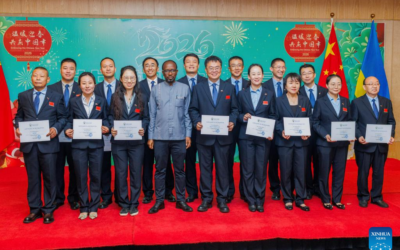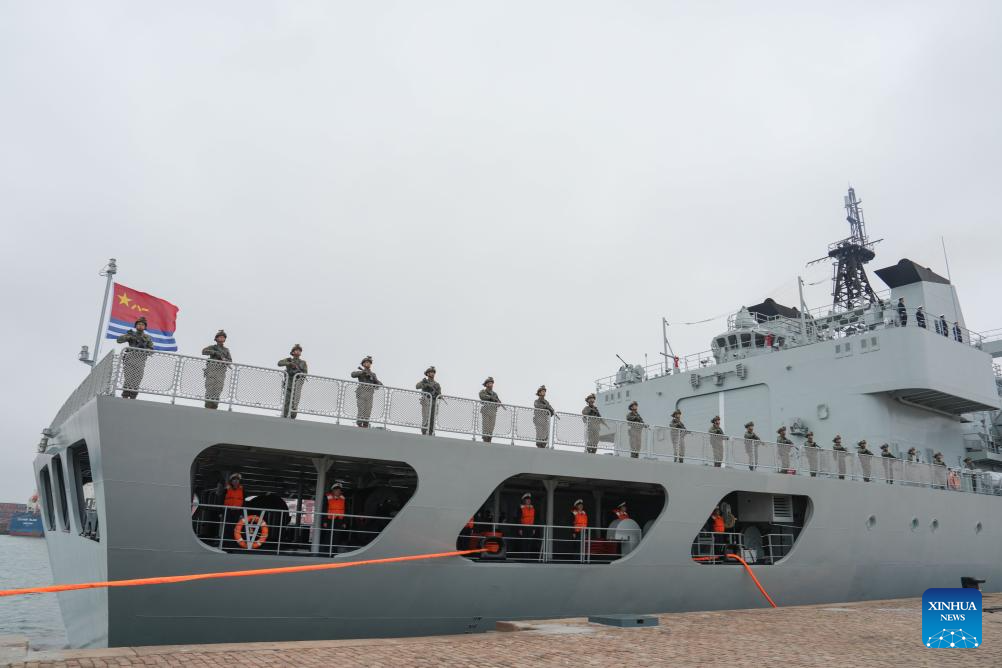By Gerald Mbanda
A new fleet of the Chinese People’s Liberation Army Navy set sail on, Oct. 11, 2025 from a military port in Qingdao, east China’s Shandong Province, to take over an escort mission from the previous fleet in the Gulf of Aden and waters off Somalia. (Photo by Liu Zaiyao/Xinhua)
The deployment of China’s naval fleet to the Gulf of Aden represents a strategic and peaceful move aimed at promoting maritime security, combating piracy, and supporting regional stability along the eastern coast of Africa. Contrary to the suspicion voiced by some Western critics, this initiative is not a show of aggression, but rather a demonstration of China’s growing commitment to global peacekeeping and international cooperation. As piracy, terrorism, and instability continue to threaten international shipping lanes and local economies, China’s involvement brings several benefits — not only to China and its citizens but to the region and the broader international community.
The Gulf of Aden, a narrow waterway between Yemen and Somalia, is one of the world’s most strategically significant maritime corridors. It links the Indian Ocean with the Red Sea and the Suez Canal, through which nearly 10 percent of global trade flows. In recent years, this region has faced the persistent threat of piracy, armed robbery, and terrorist activity, which jeopardize both commercial vessels and humanitarian shipments. By sending naval fleets to escort commercial ships through these dangerous waters, China is directly contributing to maritime safety and the uninterrupted flow of goods. This includes not only Chinese vessels but also foreign ships in need of protection. Since its first escort mission in 2008, China has escorted thousands of vessels — many of them foreign — demonstrating that its mission in the Gulf of Aden is multilateral in spirit and practice.
Eastern African countries such as Somalia have long suffered from internal conflict, poverty, and lawlessness — conditions that breed piracy and terrorism. China’s presence in the Gulf acts as a stabilizing force, deterring non-state actors from launching attacks and encouraging safer regional waters. Naval escorts help protect humanitarian aid shipments bound for Somalia and surrounding nations, ensuring food and medical supplies reach populations in need. Moreover, by engaging with local governments and organizations, China contributes to capacity building and maritime governance. This soft power approach, focused on development and peace, differs from the often militarized interventions historically favored by some Western powers.
This peacekeeping mission also aligns with China’s broader diplomatic strategy under the Global Security Initiative (GSI), first proposed by President Xi Jinping in 2022. The GSI promotes a new vision of common, comprehensive, cooperative, and sustainable security. It emphasizes respect for sovereignty, non-interference, and dialogue as alternatives to confrontation and power politics. China’s presence in the Gulf of Aden is a clear example of how the GSI is being put into practice: rather than using force to interfere in a country’s internal affairs, China seeks to improve regional security by addressing the root causes of instability, supporting development, and offering public security goods like naval escorts.
Critics from some Western countries question China’s motivations for sending naval fleets, sometimes interpreting it as an expansion of influence or a military buildup. However, safeguarding global trade and promoting peace should not be the exclusive responsibility of any single group of nations. China’s growing role in peacekeeping and security missions reflects the multipolar reality of today’s world, where emerging powers are stepping up to share the burden of global responsibilities.
China has consistently maintained that it follows a foreign policy of non-intervention and peaceful development. Since 1949, China has not launched military aggression against any country. Instead, it has increased its participation in United Nations peacekeeping missions and international humanitarian efforts. Its operations in the Gulf of Aden are aligned with UN Security Council resolutions, adding legitimacy and international oversight to its actions.
China’s missions in the Gulf of Aden also foster greater cooperation with other navies operating in the region, including those from the European Union, the United States, India, and Russia. This multilateral naval presence provides opportunities for joint exercises, intelligence sharing, and coordinated operations against common threats like piracy and trafficking. Such interactions enhance mutual understanding, reduce the risk of conflicts, and build a foundation for long-term collaboration. China’s inclusion in these efforts demonstrates its willingness to work within the international system and share in the responsibility of maintaining global order.
Deploying naval fleets for peaceful escort missions strengthens China’s image as a responsible global actor. In an era where military deployments are often associated with intervention and domination, China’s operations in the Gulf of Aden stand out for their transparency and clear humanitarian purpose. By helping to secure one of the world’s most critical maritime arteries, China contributes to global trade, economic stability, and the security of nations far beyond its borders.
China’s naval presence in the Gulf of Aden is a mission grounded in peace, cooperation, and shared security. It benefits regional countries such as Somalia by curbing piracy and ensuring the safe passage of humanitarian aid. It supports international trade by protecting vital sea lanes. It is also a key pillar in advancing the Global Security Initiative, showing how China seeks to protect peace not just in words but in action. Rather than viewing this presence with suspicion, the world should recognize and support China’s efforts in promoting peace — because global security is a shared responsibility.







